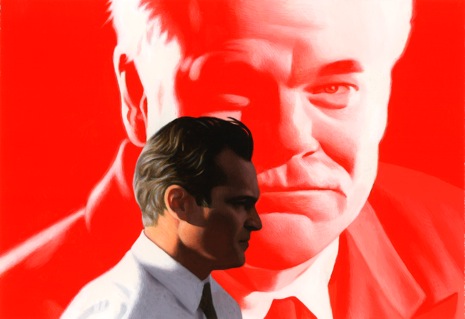Paul Thomas Anderson’s latest film, The Master, is a terrific piece of work. The former writer/director of There Will Be Blood, Boogie Nights, and Punch Drunk Love comes out with another stunning film, though it stuns us into a sort of puzzled stupor. As to what the film is about—whether it’s religion, cults, post World War II society or the relationship between master and confused follower, I have no idea. It hits on all of these themes, but doesn’t single out one for any particular length of time. It bounces around a plethora of ideas ripe for commentary and exposition but apparently isn’t interested in commentary or exposition of any kind. The Master is ephemeral, drawing our attention to certain aspects of the film only to pass over them as quickly as it introduced them. The only trajectory the narrative seems to follow is that of clouds or vapor. I don’t think this is a bad thing, though a few people may deem this to be the case, rather it is a film purposefully vague and opaque, but beautiful nonetheless. Anderson is obviously a filmmaker not interested in following traditional Hollywood formulas and in this years The Master he seems to be producing a movie that is entirely postmodern in nature—it is film for arts sake without any simple meanings attached.
The film begins with Freddie Quell (Joaquin Phoenix) a World War II Vet who exits the war as a boozer with some sort of nervous disorder and perhaps slightly unhealthy obsession with sex. He bounces around from job to job, getting in fights and making a particularly potent alcoholic drinks from ingredients like paint thinner. We are never sure what drives Freddie to drink so much or whether he does have actual mental problems (though we find out that his dad died from drinking and his mom is in the insane asylum) thus it becomes hard to classify what Freddie actually is. Is he simply a wandering and confused man with some World War II PTSD? Or does he have some significant mental problems warranting the diagnosis of insanity? Or some combination of both? Anderson never answers this question and seems ambivalent to do so.
One night Freddie Quell meets Lancaster Dodd (Phillip Seymour Hoffman) onboard Dodd’s ship after drunkenly hopping on board. He comes to find out Dodd is a writer, physicist, theoretical philosopher, but above all as Dodd says, “A man.” Dodd is the leader of a group called the Cause, which is part scientology, part new age self-help psychology. Dodd takes Quell under his wing and much of the film focuses on the relationship between the two. At first it appears that Quell needs Dodd as a sort of spiritual mentor and leader to help straighten out his life, but it becomes equally apparent that Dodd needs people like Quell to give meaning to his cause. Quell is an erratic drunk while Dodd plays opposite the pendulum as a confident spiritual director. The other confusing thing is that we are never quite sure whether Dodd himself believes the spiritual gibberish he is spewing or whether Quell believes it. At first it appears so, but after Quell leaves the group and we experience Dodd having an outburst at one of his followers for wanting to learn more, we are not quite sure who believes anything.
Though the film alludes to scientology and cultish behavior, Anderson seems indifferent to either debunking or proving any sort of religious or cultish behavior. There are some wonderful moments that show how cults function—the charismatic leadership of Dodd, Quells desire to belong to the group, and the certain amount of manipulation and guilt tripping for not giving enough to the group—but as soon as we think this is a film about a cult, it becomes a film not about cults at all.
Interesting note: There is a lot of nudity and I’m not sure what that’s about either.
Another interesting thing: there is no concrete setting. The time is Post World War II, but the members of the cause bounce around from city to city never staying in one place. There are mentions of New York and London, but it is another way in which Anderson seems to take out the ground beneath our feet. For as dark and morally muddled as There Will Be Blood was, there was a concrete setting and a concrete conflict between the two main characters that grounded us into the film. The Master ends as elusive as it begins.
The directing, writing, camera work, and acting top any other film of the year, yet the film is undoubtedly the most inaccessible of the year. Either Anderson’s film is supposed to be vague and indecipherable, or he one of those people who knows what it means and likes to laugh as we all try and write reviews about it.
So, don’t see the film as a fun date night, rather you are going to have to approach it like some novel by Albert Camus.

